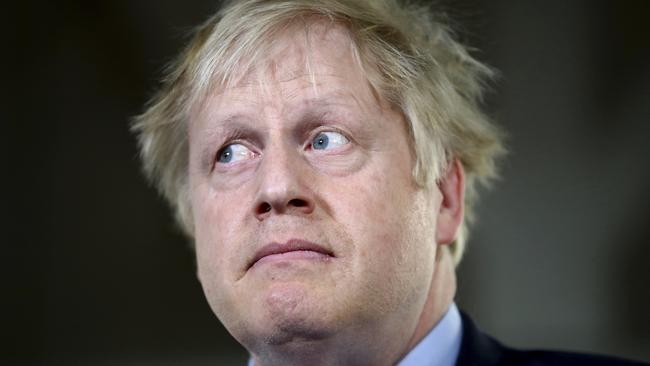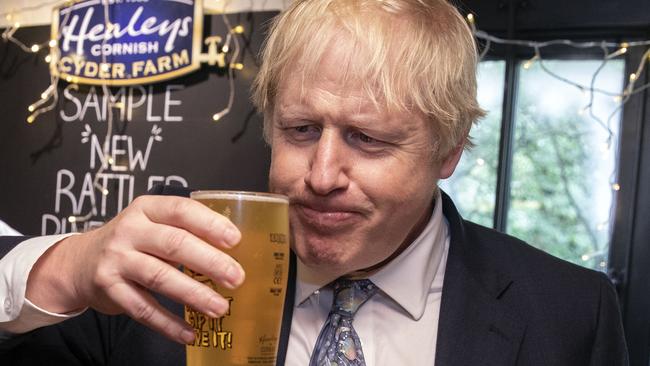
His popularity peaked when he was tied up and left to hang haplessly from a zip wire while waving the Union Jack. This was just before the hugely successful London 2012 Olympics, which as mayor he was instrumental in organising.
During his 135 days as British Prime Minister Johnson has had to row back on his attention-grabbing antics, especially since the country moved into election mode.
His caution as the six-week campaign heads into its final week — next Thursday is election day — is even more pronounced.
The 55-year-old doesn’t want to put a foot wrong.
The Conservatives are ahead by about eight points, but the margin for error, the numbers of undecideds and the push for strategic voting in some seats could produce a hefty Conservative majority or a hung parliament, possibly with Labour joining with the Scottish Nationalists to take power.
Four Brexit Party candidates this week urged voters to vote for the Tories and it is feared they could split the Conservative vote in Britain’s first-past-the-post system.
The final days are crucial, and in a handful of seats just a handful of votes will make a big difference.
The stretched National Health Service remains a prominent issue for the public and Johnson is hammering home how much the Tories will open the budget for more nurses and hospitals, while also reminding everyone about the dither and delay perils of Brexit under a Labour government. Labour is opening up its chequebook in what Labour says is an “economic revolution”.
As Prime Minister, Johnson is deeply divisive: more people don’t like him than do (47 per cent to 35 per cent).
Encouragingly, 99 per cent of those polled had heard of him and described him as: “conservative”, “confident”, “humorous”, “admirable” and “intelligent”. Male baby boomers are his biggest fans.
But his Eton schoolfriend and former prime minister David Cameron famously said: “The thing about the greased piglet is that he manages to slip through other people’s hands where mere mortals fail.”
Johnson’s negative personal polling numbers might be deeply embarrassing, except that even more people — 61 per cent — dislike his opponent, Labour leader Jeremy Corbyn, whose handling of anti-Semitism within his party’s ranks continues to rankle.
Corbyn is strongly supported by millennials, who think of him as “admirable”, “confident”, “empathetic”, “positive” and “honest”.

Johnson’s personal history has had plenty for the opposition to exploit. His colourful weekly newspaper columns have provided many eye-rolling lines such as “flag-waving piccaninnies” and “tank-topped bum boys”, and on Thursday he apologised for his pro-feminist column in which he described Muslim women with face-covering veils as looking like “letterboxes” and “bank robbers”.
Yet his unconventional private life, his history of lying (he was sacked twice for misstating or misrepresenting issues to editors), and even refusing to detail how many children he has, surely has been factored into the public’s view of him already.
The Tories are still hopeful Johnson’s swaggering style can bring off a big triumph.
For while he is viciously attacked, the slurs of being a serial liar, a bigot and an entitled toff are shrugged off. His admirers are equally passionate, describing him as the Heineken politician because he can reach into areas of the electorate others can’t.
Johnson’s popularity as Prime Minister was tested almost immediately when he sought to prorogue parliament for five weeks. This gave opponents the chance to label him a criminal because the courts ruled he had acted illegally. Remainers, of course, are threatened by his desire to “get Brexit done” by the end of January, stressing that the difficult and possibly protracted trade negotiations with the EU will be only beginning at that point if Brexit occurs.
For all that, on the hustings Johnson has a heavyweight presence Corbyn lacks, and his passion and optimism are untrammelled.
But the Prime Minister runs the risk that his attention has been spread across the country and away from his own constituency in the seat of Uxbridge and South Ruislip, west of London. Johnson holds the seat by 5034 votes, normally a reasonably safe margin, but this election is swivelling around the axes of Brexit and voter contempt about parliamentary goings-on.
Johnson faces a strong opponent, 25-year-old Ali Milani, an Iranian immigrant and student organiser who grew up on a local council estate from the age of five.
Milani was reported for making anti-Semitic comments and questioning Israel’s right to exist when he was a teenager but was cleared by the Labour Party.
There are also some eccentric independent candidates who provide amusing scenes standing once again on election night. Count Binface and Yace “Interplanetary Time Lord” Yogenstein will be up against Johnson as well as Lord Buckethead from the Monster Raving Loony Party.
Johnson is also facing a big Youth Can campaign in the constituency to get young people, particularly those at the local university, to vote against him.
If Johnson were to lose his seat, he could remain as Prime Minister and the Tory party could force a by-election and stand him in a safe seat.
He would be the second prime minister to be in such a situation, with Conservative leader Arthur Balfour losing his seat back in 1906.
London School of Economics political expert Patrick Dunleavy believes a strong electoral history of supporting standing prime ministers will help Johnson, especially as the seat voted to Leave in the Brexit referendum.
Dunleavy says if Johnson leads the Conservatives to a substantial majority, it will give him the opportunity to tack toward a softer Brexit.
“That is just a hunch, but a softer Brexit will cause least disruption to the UK economy,” Dunleavy says.




Boris Johnson, mayor of London, was once a political rock star — harmless with his tousled hair and quick-witted as he batted back one-liners, usually at the expense of the French.